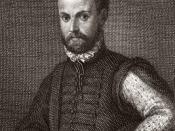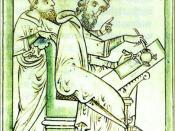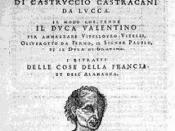Perpetuate the Power Structure that Supports the regime Or Guide Its' Citizens Towards Universal Truth When Machiavelli wrote "The Prince"� in 1513, he offered the world a new modern view of politics. He makes it extremely clear that his new "modern"� approach to politcs is based not on the lofty virtues of Socrates, Plato, and Aristotle, but rather on a "worldy and realistic"� inturpretation of the nature of man. Machiavelli cites countless historical precedences showing how they support his inturpretation of human nature. This makes his argeuments even stronger and lends considerable creadence to his ideas. However, his seemingly casual dismissal of morality, justice and virtue make his ideas repugnent to anyone who believes mankind can ever be more than an opportunistic, materialistic, creature interested only in the satisfaction of individual desires.
One of the most contimplated themes in greek philisophy is virtue and its relationship to man. Socrates taught that virtue is a divinely bestowed or inheirent understanding of what is just and what is unjust.
His investigations into the nature of virtue, lead him to his belief that "knowledge and virtue are so closely related that no human agent ever knowingly chooses evil: improper conduct is a product of ignorance rather than of weakness of the will."� Machiavellia rejects this idea of man as a virtuous creature, whose natural tendancy is towards that which is moral and just.
Machiavelli describes the nature of man saying: "For one can say this generally of men: that they are ungrateful, fickle, pretenders, and dissemblers, evaders of danger, eager for gain. While you do them good, they are yours, offering you their blood, property, lives, and children"æ when the need for them is far away; but when it is close to you they revolt.(The Prince XVII)"� Those who defend this inturpretation of human nature often point out that history is filled with countless examples of individuals who are seem to be motivated solely by their materialistic desires. Clearly in many cases Machiavelli is absolutely correct in his understanding of human nature. However, it is clear that there are people who are motivated by a sense of justice and an understanding of right and wrong. This is visable more on an individual level than on a national level but there are those shinning moments in which mankind proves we have the ability to seek truth and justice at the expence of individual gratification.
Aeschylus describes one instance in which a city state freely choose to do what they fealt was "right"� rather than what was easiest. In The Supplients, King Pelasgus is forced to choose between what he knows to be just and what is the easiest. When asked to choose he says: "It is not my house at whose harth you sit; and if The Argive State stands liable to guilt herein, the people of Argos must together work its cure. Therefore I'll undertake no pledge till I have shared this issue in full council with my citizens"� his make classic Greek play describes rather than some higher sense of truth for choose what is best for them over that which society hold acting in accordance to Machiavelli's countless examples of the views on the motivations of men by pointing to the countless individuals that seem to operate Socrates taught that virtue is a divinely bestowed or inheirent understanding of what is just and what is unjust. Socrates investigations into the nature of virtue, lead him to his belief that "knowledge and virtue are so closely related that no human agent ever knowingly chooses evil: improper conduct is a product of ignorance rather than of weakness of the will."� He explains how the inheirent flaws in all peoplhuman nature to control and motivate and what motivates and political is quite convincing in his defence of presentation of meticulous in his He dismisses the work of some of historys' greatest thinkers because they .
Replaceing the high ideals and virtues of Socrates, Plato, and Aristotle by lowering mankind to a lowest common denominator. His work, which he intended to be used as a "guide to ruling a principality,"� is radicly different from anyother political work ever writen. He with a new "modern nearly two thousand years of political gave the rulers of his day a he shifted the focus of political theory from the During the middle - ages all political and philosophical contemplation was derived from classical Greek philosophy and filtered by the Church. Plato elaborates on his teachers ideas and comes to the conclusion that, while virtue is an understanding of that which is just In 1513 Niccolo Machiavelli wrote his best-known work, "Il Principe"�, The Prince. It was a significant change in the way people examined and understood governments. Designed, to be an "Instruction Manuel"� for princes, explaining exactly how one should go about governing their principality or city-state. Not interested in the "virtue and truth"� that is so pervasive in the works of such great philosophers as Aristotle, Plato, and Socrates.
However, he takes Focusing on what he believes are more "realistic It marked an important understanding and interoperation of the forces that motivate a society and its rulers.
Impatient with abstract reflections on the way things "ought" to be, Machiavelli focused on the way things are, illustrating his own intensely practical convictions with frequent examples from the historical record.





